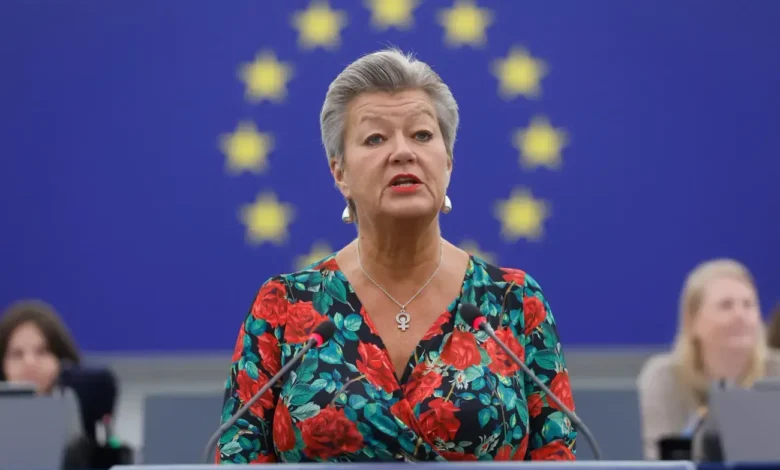The European Union has appointed a special envoy for Ukrainian refugees: what is known about Ylva Johansson

After the start of a full-scale war in Ukraine, the issue of the future of Ukrainian refugees is gradually entering a new phase. The European Union, which has provided temporary protection to millions of Ukrainian citizens, is now beginning to formulate a new long-term policy regarding the status, integration and possible return of this group. One of the first steps in this process was the appointment of a special EU envoy for Ukrainian refugees. The new position was taken by the former European Commissioner for Internal Affairs Ylva Johansson, who coordinated EU migration policy for a long time. It is reported POLITICAL with reference to the European Council for Justice and Home Affairs in Luxembourg.
The appointment of a separate special envoy is a signal that the issue of displaced Ukrainians in Europe is no longer considered a purely temporary phase, but is moving into the realm of long-term political and social settlement. Ylva Johansson, who previously held the position of a minister in the Swedish government, was the European Commissioner for Internal Affairs during 2019–2024 and participated in negotiations on the policy of admission of Ukrainians to the EU. During this time, she visited Ukraine several times, in particular the refugee camps on the Ukrainian-Romanian border, and last September she was awarded the Ukrainian Order of Merit.
The new position of the EU special envoy for Ukrainian refugees involves the coordination of the Commission’s activities to support Ukrainians, strengthening of political communication with the national governments of the member countries, and the implementation of practical mechanisms for integration and return.
According to the European Commission, as of June 2025, there are about 4.3 million citizens of Ukraine with temporary protection status in the EU. This status guarantees Ukrainians access to housing, the labor market, social services and medicine. Last month, the Commission decided to extend the temporary protection for another year – until March 2026. At the same time, in parallel, work began on a concept that would gradually remove the issue of Ukrainian refugees from the temporary regime.
The EU announced two main directions of further actions: the creation of mechanisms for the transition of a part of Ukrainians to permanent legal status and the creation of conditions for voluntary return to their homeland. For this purpose, it is planned to create special “centers of unity” – consultative hubs that should work both in Europe itself and in cooperation with the Ukrainian authorities. These centers will provide information on integration, education, employment, health services and conditions for return. In this way, the European Union is trying to combine the interests of member states, where different positions are heard: from the desire to keep part of migrant workers to the desire to reduce the social burden on the budgets of countries that have been hosting a significant number of Ukrainians for several years.
The role of the new special envoy will consist in the coordination of these processes, in presenting the position of the Ukrainian community before the governments of the EU countries and in the development of specific tools that will allow launching a complex multi-level policy around millions of displaced citizens. As European Commissioner for Migration Magnus Brunner noted, the new format should ensure greater flexibility of the European Union in responding to developments in Ukraine and within the bloc itself.
At the same time, the Ukrainian side is conducting its own discussions regarding the future repatriation of some citizens. The question of the return of Ukrainians is gradually becoming a political factor in the internal debate: both in the context of the country’s recovery and in the context of demographic prospects after the war. In a few years, a significant part of the refugees integrated into European societies: they got a job, provided education for their children, and adapted to the local health care systems. Some of the governments of European countries are already directly talking about the economic interest of keeping some of the Ukrainian migrants with them, given the shortage of labor force. In particular, Germany, the Czech Republic, Lithuania, and Poland have repeatedly voiced their readiness to offer long-term integration programs to those Ukrainians who wish to stay.
On the other side of the debate are countries where fatigue from large-scale refugee support is beginning to accumulate. Some governments have already publicly declared the need for certainty with the prospects of the status of Ukrainians, with the amount of budget expenditures and long-term obligations. That is why the European Commission tried to establish in the new strategy a balance between integration, return and preservation of political unity in the EU itself regarding common humanitarian policy.
In fact, the appointment of a special envoy marks a new stage in the policy regarding Ukrainian refugees: the transition from the regime of emergency evacuation and temporary protection to the formation of a long-term legal model in which complex issues of demography, economy, social adaptation, repatriation, preservation of labor resources and budget balance of the host countries are already at work. This stage will become a more subtle and politically sensitive part of European policy towards Ukraine in the coming years.





